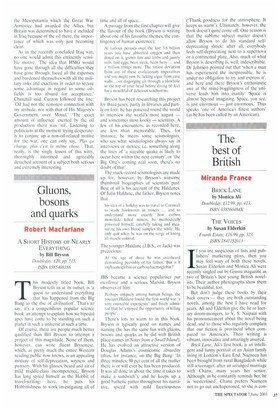Gluons, bosons and quarks
Robert Macfarlane
A SHORT HISTORY OF NEARLY EVERYTHING by Bill Bryson Doubleday, 120, pp. 515. ISBN 0385408188 This modestly titled book, Bill Bryson tells us at its outset, is 'a quest to understand everything that has happened from the Big Bang to the rise of civilisation'. That's to say, it's a compendious popular science book: an attempt to explain how we bipedal apes have come to be standing on such a planet in such a universe at such a time.
Of course, there are people much better qualified than Bill Bryson to attempt a project of this magnitude. None of them, however, can write fluent Brysonese, which, as pretty much the entire Western reading public now knows, is an appealing mixture of self-deprecation, wryness and punnery. With his glasses, beard and air of mild middle-class incompetence, Bryson has long styled himself as the Hobbit of travel-writing: here, he puts his Hobbitishness to work investigating all of time and all of space. A passage from the first chapter will give the flavour of the book (Bryson is writing about one of his favourite themes, the contingency of human existence):
At various periods over the last 3.8 billion years you have abhorred oxygen and then doted on it, grown fins and limbs and jaunty sails, laid eggs, been sleek, been furry .. and a million things more. The tiniest deviation from any of these evolutionary imperatives and you might now he licking algae from cave walls ... or disgorging air through a blowhole in the top of your head before diving 60 feet for a mouthful of delicious sandworms.
Bryson has been researching this project for three years, partly in libraries and partly on foot: he has pottered round the world to interview the world's most august — and sometimes most kooky — scientists. A few of his encounters, as recorded here, are less than memorable. Thus, for instance, he meets some seismologists, who say what seismologists always say in interviews or movies: i.e. something along the lines of 'a sizeable quake is likely to occur here within the next century', or 'the Big One's coming real soon, there's no doubt of that'.
The stuck-record seismologists are made up for, however, by Bryson's winsome thumbnail biographies of scientists past. Best of all is his account of the Haldanes. Of John Haldane, the father, Bryson notes that
his idea of a holiday was to travel to Cornwall to study hookworm in miners ... and to understand more exactly how carbon monoxide killed miners, he methodically poisoned himself, carefully taking and measurin_4 his own blood samples the while, He only quit when he was on the verge of losing all muscle control,
The younger Haldane (J.B.S., or Jack) was precocious:
At the age of three he was overheard demanding peevishly of his father, 'But is it oxyhaemoglobin or earboxyhaemoglobin?'
JBS became a science populariser par excellence and a serious Marxist. Bryson observes of him: Perhaps uniquely among human beings, the younger Haldane found the first world war 'a very enjoyable experience. and freely admitted that he 'enjoyed the opportunity of killing people'.
There's lots to warm to in this book. Bryson is typically good on names and naming (he has the same fun with gluons, bosons and quarks as he did with British place-names in Notes from a Small Island). He has evolved an attractive version of Douglas Adams's cosmicomic absurdity (thus, for instance, on the Big Bang: 'In three minutes, 98 per cent of all the matter there is or will ever be has been produced. It was all done in about the time it takes to make a sandwich), and he keeps up a good bathetic patter throughout his narrative, spiced with mild facetiousness
(`Thank goodness for the atmosphere. It keeps us warm). Ultimately, however, the book doesn't quite come off. One reason is that the sublime subject matter doesn't allow Bryson to do his standard selfdeprecating shtick: after all, everybody feels self-deprecating next to a supernova or a continental plate. Also, much of what Bryson is describing is, well, indescribable. Dr Johnson pointed out that 'when a man has experienced the inexpressible, he is under no obligation to try and express it', and here and there Bryson's enthusiastic awe at the mind-bogglingness of the universe leads him into inanity: 'Space is almost beyond imagining. Space, you see, is just enormous — just enormous.' Thus speaks 'one of America's finest authors' (as he has been called by an American).










































































 Previous page
Previous page